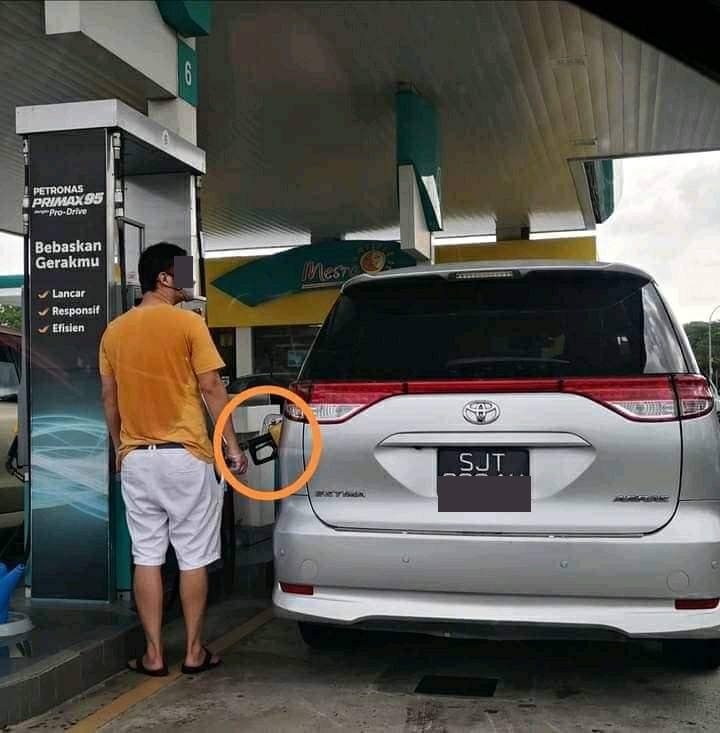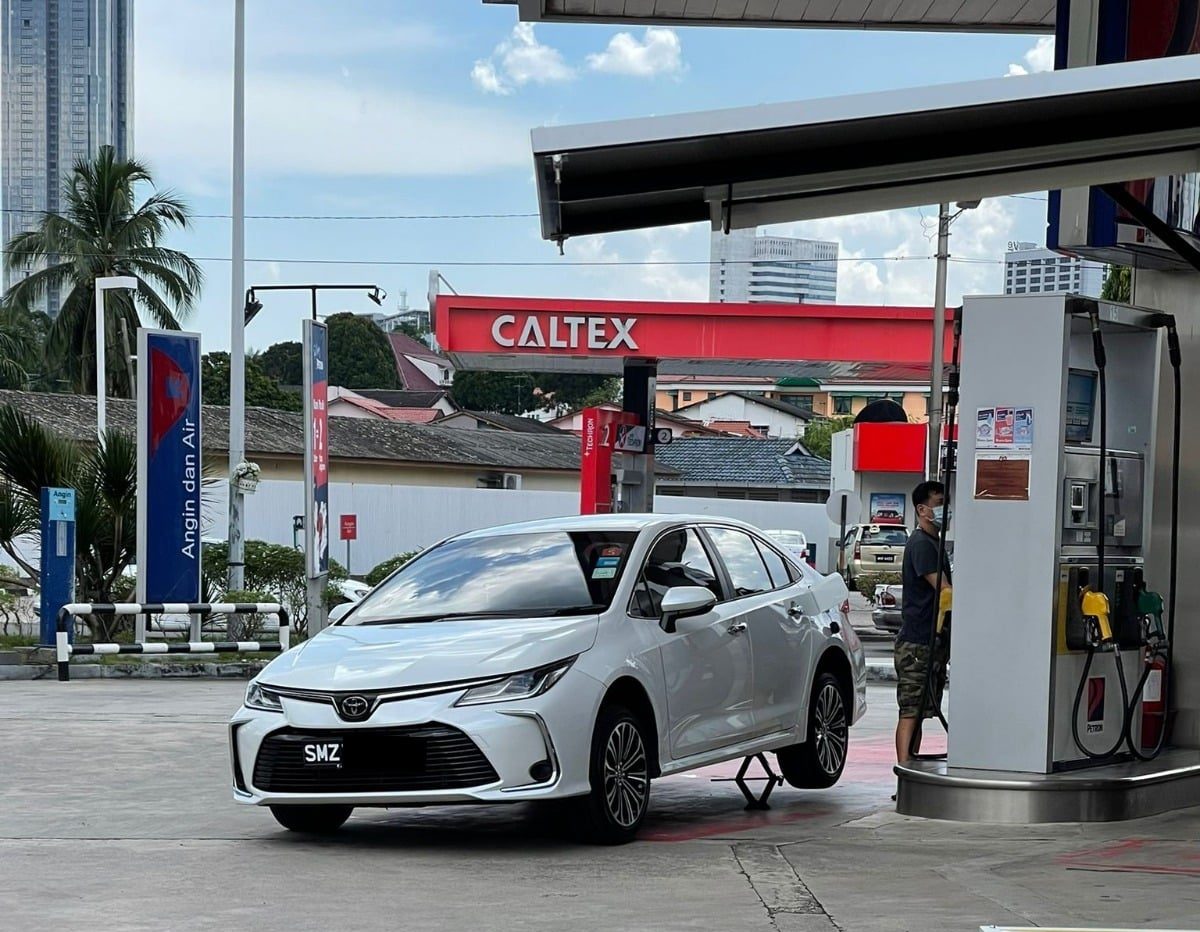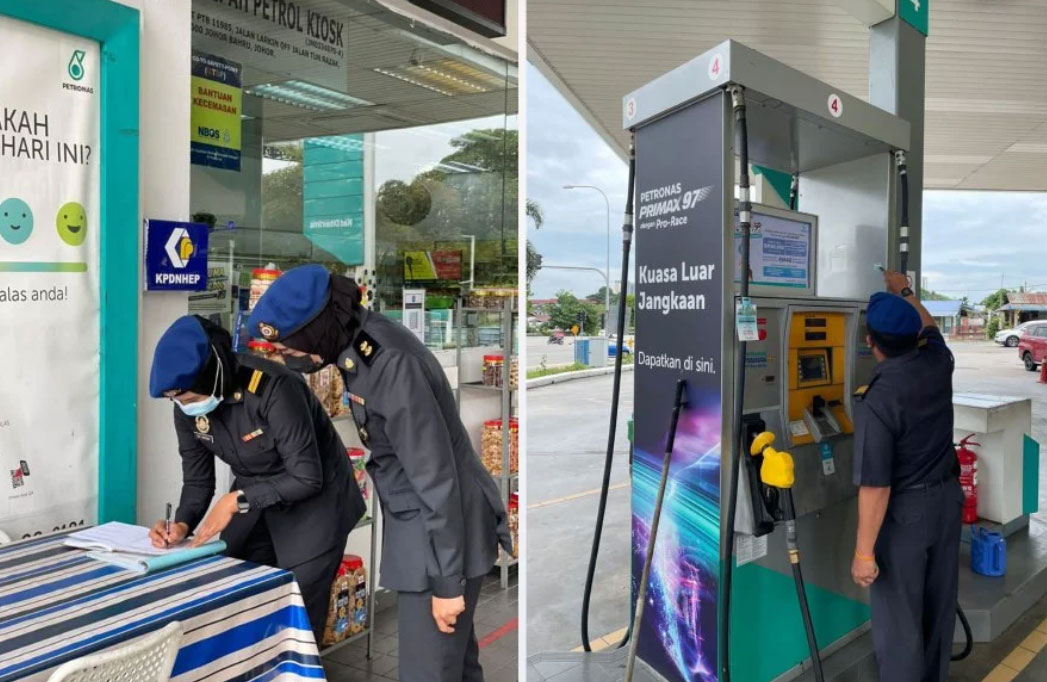Singaporeans, we like things cheap.
If there’s a discount for something worthwhile, you bet there will be a long queue in line just to snag some of the cheaper goods. It’s all in the in-built spirit of being kiasu.
Cheaper Petrol Prices in Malaysia
Therefore, it shouldn’t come as a surprise that when the borders re-opened on 1 April, many Singaporeans went to the neighbouring country to fill their cars with petrol instead.
For one, anything is bound to be cheaper when the exchange rate is SGD$1 to RM$3.1.
Secondly, even by Malaysian citizen standards, oil prices are significantly cheaper compared to the oil prices worldwide.
There’s a very good reason why Johor remains as one of Singaporeans’ favourite shopping spots, because they get more value out of their hard-earned money, as Singapore suffers from the rise in costs of living and inflation.
Naturally, some people weren’t happy about it.
But the surprising twist is that it was former Malaysian Prime Minister Najib—Mister I received a “genuine donation” of RM$1 billion from Saudi Arabia–who voiced the concern first.

On 3 April, Najib took to Facebook to criticise foreigners who were pumping petrol cheaply in Malaysia.
In the image attached, it shows a Singapore-registered car making use of a petrol kiosk with a yellow handle.

The Subsided Ron95 Petrol
Among many policies that Malaysia has instituted to assist lower-income families, subsidised petrol prices is one of them.
The yellow pump specifically dispenses Ron95 petrol, which is the cheapest available grade of petrol in Malaysia at RM2.05 (S$0.66) per litre.
The price ceiling is so low because the petrol is heavily subsidised by the Malaysian government, which means it’s only meant for Malaysians.
The sale of Ron95 petrol to foreigners is an offence in Malaysian law.
Individuals who ignore the Control of Supplies Act of 1961 may face a maximum fine of RM1 million (S$312,000), three years of imprisonment, or both, though the extent in which this law is enforced isn’t publicly known.
The Thick Skin of Singaporeans
Okay, so it’s one thing to buy the Ron95 petrol despite being a foreigner, but it’s quite another to make the most out of it.
Apparently, one Singaporean had the bright idea of bringing a jack lift to tilt his vehicle upwards so that they can pump more petrol.

As you can see from the image, the Toyota Corolla Altis is lifted by a car jack to ensure that more petrol is being pumped into the car.
Frankly speaking, should the driver be applauded for his ingenuity or audacity?
Regardless, the images of Singapore-registered cars taking advantage of the cheaper petrol prices in short succession has left the neighbouring country fuming.
It was most definitely not met with a ‘mi casa es tu casa’ (my house is your house) reaction from the Malaysians. Which is totally understandable.
The Specifics of Najib’s Post
In his Facebook post, Najib remarked that Malaysian authorities should be monitoring the sale of petrol more closely now that the land borders have reopened.
He writes, “Ron95 petrol is a controlled item because it is highly subsidised. It is against the government’s Supply Control Act to sell Ron95 to foreigners.”
To give insight into how cheap Ron95 is, Najib lists that it’s the 11th lowest price for petrol in the world; cheaper compared to oil-producing countries such as Saudi Arabia, Qatar, United Arab Emirates (UAE), Jordan, and Oman.
He also reinforces that Ron95 is strictly for Malaysians only.
Join our Telegram channel for more entertaining and informative articles at https://t.me/goodyfeedsg or download the Goody Feed app here: https://goodyfeed.com/app/
The Difference in Oil Prices Between Two Countries
Najib goes on to add that Ron97, which can be sold to foreigners, is priced at RM3.91(S$1.26) per litre in Singapore.
Though he doesn’t explicitly state Singapore by name, it’s clear that he’s referring to us.
He wrote that Malaysia prices its Ron97 petrol at RM3.91 (S$1.26) per litre, which is still significantly cheaper than its neighbouring country that sells it at S$3.02 (RM9.37) to S$3.51 (RM10.90), because of the high taxes on petrol.
In short, Najib is saying: we’re already selling our petrol at such a cheap price, do you think we are bodoh (stupid) or gila (crazy) to sell you our cheapest petrol?
They want to earn revenue from foreigners, not make losses.
Compared to Singapore, Malaysia has taken the opposite route, choosing to subsidise a particular type of petrol and making it affordable instead, because vehicular transport is extremely important in their expansive country.
Whereas the Singaporean government tries its best to encourage the usage of the widely accessible and connected public transport, whilst discouraging car ownership with high bidding prices for the Certificate of Entitlement (COE), more expensive cars, taxes on petrol, and Additional Registration Fees for Luxury Cars.
It’s really the matter of priorities which affect government decisions and controls on petrol prices.
Why the Control Supply Act Matters in Malaysia
The reason why Najib was vocally against the sale of Ron95 petrol to foreigners its an abuse of government funding. He elaborates, “If foreigners fill up 40 litres of Ron95 only, the government will lose RM68 (S$21.90) of the Malaysian’s money to foreigners.”
Najib then highlighted the ban on selling Ron95 to foreigners is a policy that was implemented during his tenure as Prime Minister.
Since Aug 2010, Malaysian citizens driving foreign-registered cars are required to show their MyKad—Malaysian identity card—before they are allowed to buy Ron95.
Moreover, the person who oversaw the establishment of the ban was the former domestic trade and consumer affairs minister Ismail Sabri Yaakob, who is currently the new Prime Minister of Malaysia.
Swift Response from Malaysia’s Trade Ministry
Shortly after Najib’s post was put up, the domestic trade and consumer affairs ministry announced that it was ceasing the sale of subsided petrol to foreign vehicles.
Minister Alexander Nanta Linggi told the local authorities to investigate the Singapore-registered car that was purchasing the Ron95 fuel, and affirmed that more aggressive surveillance will be carried out at all petrol stations.

Next, he ordered petrol companies and petrol station operators in Johor Bahru to stop selling Ron95 petrol to foreign vehicles, which implicitly targets Singapore cars.
Hurdles in Monitoring Ron95 Sales
However, the Petrol Dealers’ Association of Malaysia (PDAM) President Khairul Annuar Abdul Aziz admits that it’s difficult to constantly ensure that Ron95 petrol won’t be sold to foreigners due to the lack of manpower.
In order to make sure that no fish slips out of the net, Khairul states that it may require 10 people at the pumps at any given time to ensure that Ron95 is only used by the locals.
Since petrol stations tend to run on a 24-hour basis, there tends to be three shifts in place, which would translate to 30 staff members. Since companies have to give employees the minimum wage of RM1,500 at least, it would cost RM45,000 just to keep up with that amount of manpower at one petrol station.
The costs of manpower are bound to pile up quickly, thus heavily affecting the profit margin the petrol companies earn.
Khairul said, “If we are provided with the funds, then we can engage more workers, otherwise we can’t afford it.”
Of course, Khairul offers the usage of technology to make up for the lack of manpower.
For instance, drivers have to show their identification cards at the pump before being able to make a purchase or using nana-tags and placing heavy fines on those caught breaking the law.
Apart from that, he waved off the idea of disallowing foreign credit cards to purchase Ron95 fuel.
Which makes sense, because domestic or foreign credits aren’t exactly the best proof of identity. Singapore has Maybank branches, a bank that has its roots in Malaysia.
Malaysians can use foreign bank cards too.
The payment method matters less than the verification of identity.
Read Also:
- M’sia McDonald’s Offering Apple Pies or Sundae to Replace Fries Due to Potato Shortage
- Minister Ong Ye Kung Explains Why VDS Isn’t Still Removed Despite a Major Reopening
- Putin’s Approval Rate in Russia Apparently Rose After Ukraine Invasion
- Touching Reunion of Young Man Returning to M’sia After Borders Reopen Got Almost a Million Views
Featured Images: Facebook (Najib Razak) & Malaysia Ministry




